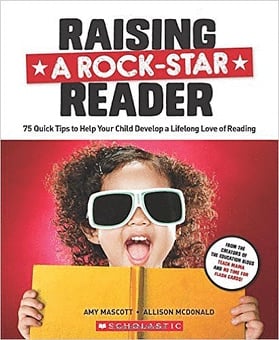Rhyme is a super-worthwhile skill for children, and whether you have 2 minutes or 20, you can always find some way of sneaking in some fun rhyme games!
What is rhyme, and why is it so important? Rhyme is the repetition of certain sounds in two or more words, such as cat and bat, bear and stare, and broke and joke. And rhyme is important because it helps kids to develop phonological awareness—or their ability to hear, identify, and manipulate sounds in words. We really need kids to be able to hear sounds in words so that they will be able to read words on the page down the road.
So what are the 3 best rhyme games for kids? Take a look:
1. Rhyme Challenge: Whether you are in the car, walking home from school, or sitting poolside, Rhyme Challenge is an easy game that requires no set-up, clean-up, or materials whatsoever. We often play it in the car or sometimes even at the dinner table.
For Rhyme Challenge, one person chooses a word and says, I challenge you to think of as many rhymes as you can for "cat" (or any word). And the next player says as many words as he can that rhyme with that word. Both players keep count. I try to model saying the given word with the rhyming word so my little ones stay on track with rhymes (Cat, bat. Cat, hat. Cat, mat. . . ), but this isn't necessary for older kids.
My kids love any challenge, so adding rhyme to the mix just ups the fun – and the learning.
Also try:
- Having one person choose a word then take turns saying just one rhyming word, one right after the other.
- Speed rounds," where we yell out rhyming words as fast as we can. Or, you can do "slow rounds" – it really depends on the day.
2. Rhyme Any Time: Sometimes I'll pull out the magnetic letters and put a word on the refrigerator, like "cat" or "top" or "bake." Then, any time I'm in the kitchen—making lunches, cooking dinner, whenever—and a child wanders in, I'll say "Hit me with a rhyme on the fridge." And from there, we have a quick rhyme game.
Depending on the child, I may say:
- How many words can you create that rhyme with the word on the fridge?
- Let's say all of the rhyme words together.
- Now you choose a starting word, and we'll rhyme with yours.
- Let's make some sentences using as many of those rhyme words as we can.
Making solid comparisons like this–and isolating individual sounds this way–is a great way of developing phonological awareness for little ears.
3. Rhyme Go Fish!: Rhyme Go Fish! is just like the old Go Fish! game we all love, except that this version uses rhyme words on cards.
This game is great for emerging readers who already have a handful of sight words and early word families down.
To play Rhyme Go Fish! all of the cards are placed in the "pond" and each player takes five cards. After checking to see if anyone has any rhyming pairs, the game begins.
Player one asks the player to his left, Do you have a word that rhymes with "men?" Player two reads her words and determines whether she has a match or not. If she does, she hands it to the first player. If not, she says, Nope! Go Fish! Play continues until the first player has no cards in his hand.
What rhyme games does your family like to play? Share your thoughts on the Scholastic Parents Facebook page, or find me on Twitter @teachmama, and let's continue the conversation!
---
Check out bloggers Amy Mascott and Allie McDonald's book, Raising a Rock-Star Reader: 75 Quick Tips for Helping Your Child Develop a Lifelong Love for Reading. Get expert advice and learn new strategies for your young readers.


